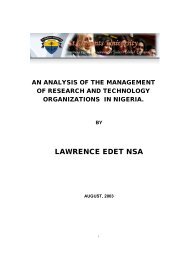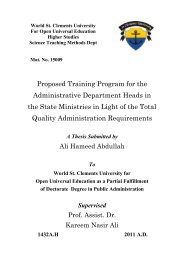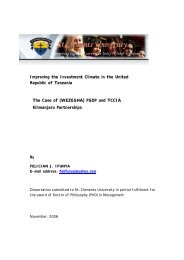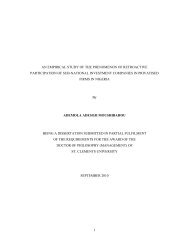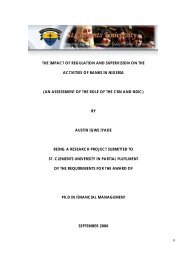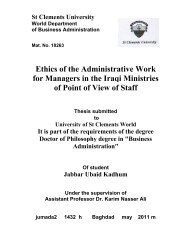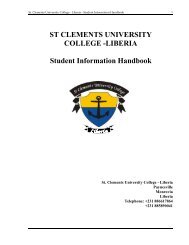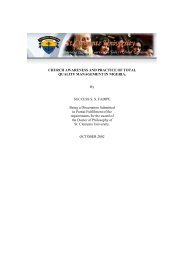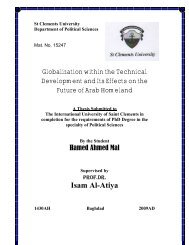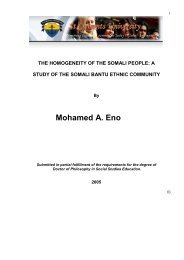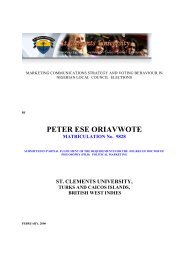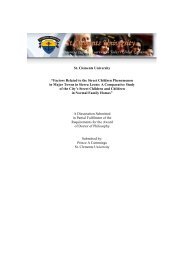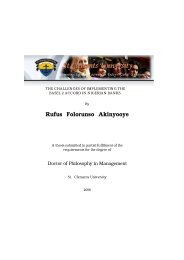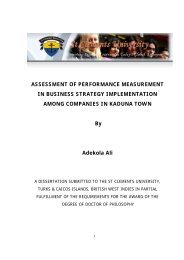The role of informal microfinance institutions in saving
The role of informal microfinance institutions in saving
The role of informal microfinance institutions in saving
You also want an ePaper? Increase the reach of your titles
YUMPU automatically turns print PDFs into web optimized ePapers that Google loves.
1.1.10: AFRICAN SACCOs AND THEIR ENVIRONMENT<br />
THE THREE SYSTEMS FOR OFFERING SAVINGS AND CREDIT SERVICES<br />
In most African countries, three systems for <strong>of</strong>fer<strong>in</strong>g sav<strong>in</strong>gs and credit services rub shoulders,<br />
sometimes, <strong>in</strong> competition with one another, but most <strong>of</strong>ten without their be<strong>in</strong>g a true<br />
competition among them to the extent that they <strong>of</strong>fer different types <strong>of</strong> service or service<br />
different clienteles as follows:<br />
• Centralized F<strong>in</strong>ancial Systems: - This refers to commercial and/or bus<strong>in</strong>ess banks that<br />
operate primarily <strong>in</strong> an urban environment and the f<strong>in</strong>ancial <strong><strong>in</strong>stitutions</strong> under more or<br />
less direct control <strong>of</strong> the Government. <strong>The</strong>y are subjected not only to general commercial<br />
laws, but also to specific bank<strong>in</strong>g regulations and central bank supervision. <strong>The</strong> <strong><strong>in</strong>stitutions</strong><br />
operat<strong>in</strong>g under this system are sometimes referred to as Formal F<strong>in</strong>ancial<br />
Institutions/system.<br />
• Decentralized F<strong>in</strong>ancial Systems: - This denom<strong>in</strong>ation is used to designate <strong><strong>in</strong>stitutions</strong> and<br />
networks that were developed as alternatives to commercial banks and the <strong><strong>in</strong>formal</strong><br />
structures for <strong>of</strong>fer<strong>in</strong>g f<strong>in</strong>ancial services close to the people. It comprises, <strong>in</strong> particular, the<br />
different networks <strong>of</strong> SACCOs (rural cooperatives, mutual credit societies, people’s banks),<br />
but also different alternative experiences <strong>in</strong>troduced by NGOs. <strong>The</strong> <strong><strong>in</strong>stitutions</strong> under this<br />
system are registered, but are not subjected to specific bank<strong>in</strong>g regulations and central<br />
bank supervision. In Tanzania, for examples, SACCOs are registered under the<br />
Cooperative Act and are supervised by the Government department <strong>of</strong> Cooperative<br />
Department.<br />
• Informal F<strong>in</strong>ancial Systems: - This refers to the range ROSCAs (Rotat<strong>in</strong>g Sav<strong>in</strong>gs and<br />
Credit Associations) <strong>of</strong> the tont<strong>in</strong>e type and door-to-door bankers, <strong>in</strong> particular. S<strong>in</strong>ce<br />
these are not registered nor are supervised by government mach<strong>in</strong>eries. Often loans<br />
are granted based on the familiarity with the borrower. In Tanzania they operate as<br />
‘‘Upatu’’ or ‘’Kibati’’, and other features as family or localized groups such as<br />
‘’Ifogong’ho’’ <strong>in</strong> Sh<strong>in</strong>yanga and Mwanza regions.<br />
48



